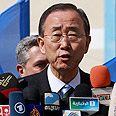
UN chief: Syria yet to send 'clear signal' on peace
Syria has failed to fully withdraw troops, heavy weapons from towns, Ban Ki-moon says, noting increasing violence, casualties
Syria has not fully withdrawn troops and heavy weapons from towns, so far failing to send a "clear signal" about its commitment to peace, the UN chief said, underlining Western fears over the prospects for a week-old truce.
In the first progress report since the Security Council passed a resolution on Saturday authorizing the deployment of observers, Secretary-General Ban Ki-moon proposed an expanded mission of 300 personnel to monitor a shaky ceasefire between forces loyal to President Bashar Assad and opposition fighters.
Related articles:
- 'Asma, your husband murders and you worry about style?' Golan residents mark Syria's independence, back Assad Syria: 55 killed since truce went into force
The report will be crucial in determining whether conditions are right for deploying the mission at a Security Council meeting on Thursday, a day after an advance group of observers were swarmed by protesters against Assad's 12-year rule.
The scenes of UN vehicles being stuck in crowds and men running away to the sound of gunfire in the outskirts of the capital Damascus, were an echo of an earlier monitoring mission by the Arab League, which collapsed in January.
"The Syrian government has yet to fully implement its initial obligations regarding the actions and deployments of its troops, or to return them to barracks," Ban told the Security Council in a letter obtained by Reuters on Wednesday.
"Violent incidents and reports of casualties have escalated again in recent days, with reports of shelling of civilian areas and abuses by government forces," he said. "The government reports violent actions by armed groups."
Larger observer mission?
While the truce worked out with international envoy Kofi Annan has held in some parts of Syria, in strong opposition areas such as Homs, Hama, Idlib and Deraa the army has kept up attacks on rebels.
Syria pledged that it would cease using heavy weapons against what it calls foreign-backed terrorists, who have killed 2,500 soldiers and police. The ceasefire officially came into force last Thursday.
Damascus has challenged Ban over the size and scope of the mission, dismissing his efforts to increase the number of observers and secure European help in supplying planes and helicopters as unnecessary.
Syrian Foreign Minister Walid Moualem said on Wednesday 250 people was a "reasonable number", adding they should be from countries such as China, Russia, Brazil, India and South Africa – all more sympathetic to Damascus than the West or the Arab League. He also dismissed any need for UN aircraft.
In the report, Ban expressed some hope that there may be a chance for progress on ending the 13-month conflict.
He said the advance team had visited the town of Deraa and "enjoyed freedom of movement", but its initial request to visit Homs, a center of the uprising against Assad, had been refused.
"At the same time the very fragility of the situation underscores the importance of putting in place arrangements that can allow impartial supervision and monitoring," he said.
Shelling continues
On Wednesday, Syria's army kept up its shelling of targets in Homs in violation of the ceasefire deal. Explosions shook the Khalidiyah quarter and plumes of black smoke drifted over the rooftops.
To the north, in Idlib province, six members of the security forces were killed by a bomb placed by an "armed terrorist group", the state news agency SANA said. It was the second such attack in two days. Syria bars access to most independent journalists, making it hard to verify accounts of the conflict.
"We are at a crucial turning point," US Secretary of State Hillary Clinton said at a meeting of NATO ministers in Brussels.
"Either we succeed with ... the Annan plan with the help of monitors ... or Assad will squander his last chance before additional measures have to be considered."
Clinton will join Arab and European foreign ministers from the informal Friends of Syria group in Paris on Thursday.
"We will continue to increase the pressure on Assad," she said, adding that she had spoken to counterparts about the need to "tighten sanctions, tighten pressure on the regime, on those who support the regime".
- Receive Ynetnews updates directly to your desktop










